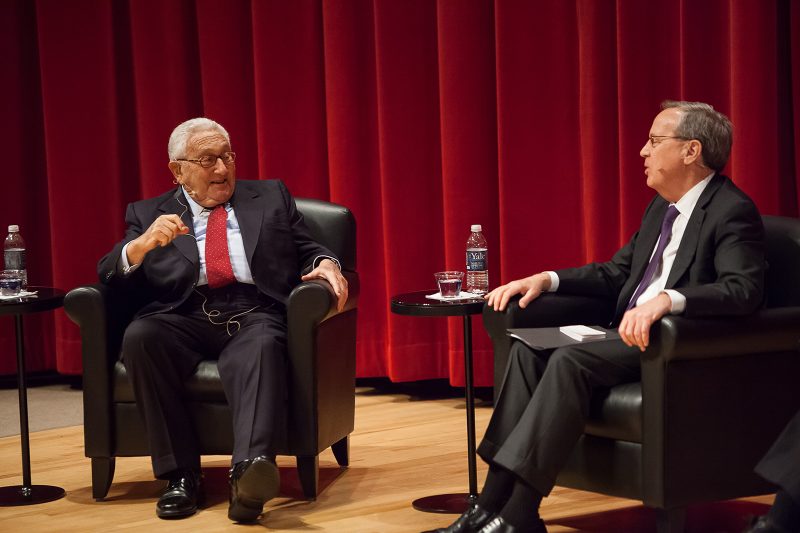President Richard C. Levin and Dr. Henry A. Kissinger participated in a two-day conference at Yale entitled, “American Diplomacy: Past, Present, and Future.” The conference focused on the upcoming twentieth anniversary of Dr. Kissinger’s treatise Diplomacy and the continued relevance of that work to U.S. foreign policy today. This was the second such conference of the Johnson Center for the Study of American Diplomacy, made possible by Dr. Kissinger’s donation of his papers to Yale and a generous gift from Charles B. Johnson ’54 and Nicholas F. Brady ’52.
As a program of the Jackson Institute for Global Affairs, and in collaboration with International Security Studies and the Brady-Johnson Program in Grand Strategy, the Johnson Center brings prominent statesmen and academics to campus as Kissinger Senior Fellows and Kissinger Visiting Scholars, as well as hosts an annual conference and a variety of other events relating to international affairs.
President Levin and Dr. Kissinger opened the conference with welcoming remarks on Friday, April 12, in the McNeil Auditorium of the newly renovated Yale Art Gallery. President Levin and Yale Professor John Gaddis then moderated a wide-ranging interview with Dr. Kissinger that focused on topics ranging from diplomatic history to the present day, including the Cold War, 9/11 and the wars in Iraq and Afghanistan, U.S.-China relations, and the nuclear programs of Iran and North Korea.
“Henry Kissinger is a world-renowned statesman but also an exceptional scholar, whose memoirs and writings on foreign affairs continue to inspire and remain just as relevant as ever. We are fortunate to have him so deeply engaged at Yale, and we are grateful to Charlie Johnson and Nick Brady for supporting this wonderful initiative.”
” I always enjoy my time at Yale, and I am delighted with the development of the Johnson Center,” remarked Dr. Kissinger. “This thought-provoking conference is just one example of the Johnson Center’s potential, and of Yale’s commitment to the study of statecraft and diplomacy.”
“The Johnson Center is such a remarkable addition to the Jackson Institute for Global Affairs,” said Professor James Levinsohn, the Institute’s Director. “Dr. Kissinger’s presence on campus is invaluable to our students, as are Yale’s first two Kissinger Senior Fellows, Ambassadors Ryan Crocker and Marc Grossman.”
“It is fitting that the Johnson Center’s second conference focused on Dr. Kissinger’s storied book Diplomacy,” noted Professor John Gaddis, Director of the Brady-Johnson Program in Grand Strategy. ” That timeless work traced the origins of modern day statecraft and it has been one of the inspirational texts for the Studies in Grand Strategy seminar. It is a personal pleasure for me to introduce the author to our students.”
The second day of the conference, April 13, included three panels featuring a number of other distinguished practitioners and scholars. The first panel, moderated by Brady-Johnson Distinguished Fellow Ambassador John Negroponte (’60), focused on diplomatic lessons from Iraq, Afghanistan, and Pakistan, and featured Yale’s first two Kissinger Senior Fellows, Ambassadors Ryan Crocker and Marc Grossman.
The second panel was moderated by Jackson Senior Fellow General Stan McChrystal (ret.) and focused on the relationship between diplomacy and military power. The panel featured former national Security Advisor Stephen Hadley (LAW ’72), former Commander of U.S. Central Command General James Mattis (ret.) and Jackson Senior Fellow Emma Sky.
History Professor and Director of International Security Studies Adam Tooze moderated the third panel, which focused on diplomacy and economic power. The panel featured Ambassador Carla Hills (LAW ’58) , Jackson Senior Fellow Stephen Roach, Director of the Yale Center for the Study of Globalization Ernesto Zedillo (Ph.D. ’81).
Contact: Ted Wittenstein, Executive Director, Johnson Center for the Study of American Diplomacy, 203-436-5946.
